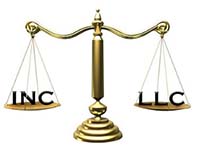The Importance of Proper Business Entity Formation: Protecting Your Assets and Ensuring Long-Term Success
Starting a business is an exciting venture, but it also comes with significant responsibilities. One of the most critical decisions you will make is choosing the appropriate business entity structure. This decision can have far-reaching implications for your personal and financial future.

Valerie L. Kramer, a seasoned Business Entity Formation Attorney with over 30 years of experience, offers invaluable guidance to entrepreneurs and business owners in Orange County. By leveraging her expertise, you can establish a solid legal foundation for your business, ensuring protection for your personal assets and setting the stage for long-term success. She offers free phone consultations at (714) 395-5669 where you can discuss the types of incorporations possible, the tax implications of each type, and answer all your business entity questions. You can then choose to sit-down with attorney Kramer later, or instruct her in the phone call to begin the incorporation process immediately with no office visit needed. The entire incorporation process can be done by phone and email.
First Business Decision: What California Entity to Form?
Why Business Entity Formation Matters

The process of business entity formation involves selecting and legally establishing the type of entity under which your business will operate. This decision is crucial because it determines how your business will be taxed, the extent of your personal liability, and the ease with which you can raise capital. The primary types of business entities include sole proprietorships, partnerships, corporations (C-Corps and S-Corps), and limited liability companies (LLCs). Each entity type has its advantages and disadvantages, and the right choice depends on your specific business needs, goals, and the nature of your industry.
What if you have significant growth? Do you want your tax preparation to remain simple, while significantly lessening the chances for and IRS audit? What –exactly– are you trying to accomplish?
Protect Your Personal Assets (Home, Cars, Cash, Etc.)
By setting up your business as a separate stand-alone entity – you will generally be able to shield your personal assets (home, vehicles, bank accounts, etc.) thus limiting liabilities to the business’s total assets. If the economy turns, someone files a lawsuit (warranted or frivolous) you stand a far better chance of keeping your personal assets protected. As a bonus, you will often have it easier getting business credit and attracting investors if that would be helpful. No matter what your objectives are, we are here to help by offering you practical and legal advice. Valerie offers Fixed-Fee Incorporation or LLC Entity Packages – keep reading…
Start Your Incorporation or LLC Today
Valerie L. Kramer is an experienced Orange County entity formation lawyer. Valerie is skilled in assisting her clients to consider the pros and cons of each entity as they relate to their unique circumstances. Together, you and she, can intelligently choose the best type of entity that makes the most sense for your personal and business objectives.
Fixed Fee Entity Formation Pricing
Valerie L Kramer offers a reduced cost “fixed fee package.” For Valerie, business entity formation, as a ‘lost leader’ legal service. Valerie charges a flat $1,000 fixed fee for INC or LLS (there are some minor filing fees that are extra). Sure, you can save a few hundred bucks at the paper mills or Legal Zoom, but you will not get the legal brainstorming session, legal advice, explore tax ramifications, nor get any practical legal coaching. All are paramount to setting up your business correctly. The downside of saving a few hundred dollars is the potential of calling a lawyer a year or five years from now with a lawsuit in hand or tax audit letter with no basis to fight back.
Fixed-Fee Entity Formation Packages: what is included and what is excluded in my
$1,000 Flat Fee Entity Package for a typical Incorporation:
One of the unique aspects of Valerie Kramer’s services is her fixed-fee entity formation packages. For a flat fee of $1,000 (plus minor filing fees or “out of pocket costs”), Valerie will handle all aspects of your business entity formation, including:
– Preparing and filing the Articles of Incorporation or Organization
– Drafting Bylaws or an Operating Agreement
– Preparing and issuing stock certificates (for corporations)
– Filing necessary notices and elections, such as the Subchapter S election
– Conducting your organizational meeting and preparing the minutes
– Providing guidance on ongoing compliance requirements
This all-inclusive package provides peace of mind, knowing that your business entity is being set up correctly by an experienced attorney who will also educate you on the basics of maintaining your entity’s legal protections.
Please note that the flat fee does not include any extra agreements or services such as shareholder buy/sell agreements, voting trust agreements, or intellectual property services (i.e., trademarks). Any such extra agreements or services would be charged on an hourly rate basis.
“I charge a flat fee of $1,000.00 to set up your entity – plus any ‘out of pocket costs’ such as the filing fee for the Secretary of State, the cost for your corporate kit, etc. The corporate kits are approximately $100.00, which includes your corporate book, corporate seal, stock certificates, etc. The services which I include in the flat fee of $1,000.00 include preparing and filing your Articles, preparing your Bylaws, preparing your stock certificates, issuing the stock, filing any required notices pertaining to the stock issuance, preparing your Subchapter S election if desired, preparing your Subchapter S agreement if desired, preparing your Close Corporation Agreement if required, preparing your organizational meeting minutes, conducting our first meeting together, and generally making sure that you are ‘up and running’ for your first year and that you understand the basics of running your California corporation.”
The Risks of DIY Business Formation: A Sanctuary for “Walking Wounded”
Do you have any clue as to how many victims there are who —attempting to save a few hundred dollars — set up their new business using a Paper Mill Operation such a Legal Zoom without getting legal advice? We get routine callers who are being sued and their entity was not properly setup, or properly maintained. Repetitive and often depressing stories or lawsuits that should have easily been brushed aside but are now a serious threat to taking down their business, piercing the corporate shield and exposing their home and life-long assets to forfeiture. Many entrepreneurs are tempted to save money by forming their business entity through online services or on their own. However, this approach can lead to significant risks and complications. Valerie Kramer frequently receives calls from business owners who used a “paper mill” service and are now facing lawsuits or tax issues because their entity was not properly established or maintained. These situations often result in the dreaded “piercing of the corporate veil,” where the courts decide that the corporation is merely a shell and hold the owners personally liable for the business’s debts.
Legal Zoom and other paper mills are no substitute – for setting up your business –your dream— correctly. It is like building a new $1,000,000 Orange County home on cinder blocks instead of a legitimate, solid and legal reinforced-concrete foundation. Yes, it will cost a fraction more to have a real attorney set-up your entity, but a new business (or a small sole proprietorship going mainstream) must be set up carefully and then MANAGED precisely so that any protections that the entity afford you are not unwittingly relinquished by inaction or not following through on all the requirements that you MUST do to keep the protections and tax advantages valid.
Setting up a new business entity is, in many ways, more serious – than getting married. If you choose the wrong entity, or then manage the entity incorrectly, you can end up broke, in debt, all your assets taken away by strangers, and your dream forever dashed on the rocks. These are the CALLS that business litigation attorneys receive every year. It is so tragic and totally avoidable… If only you had sat down with an experiences business entity formation attorney who will teach you, as part of your business entity formation flat fee, the basics on how to care for your state-sanctioned and regulated legal entity.

Even if you do choose the proper entity, within just months – your state-regulated entity could lose its power to protect you because no one ever taught you all the ongoing steps you MUST make to have your entity remain in good standing with the State, and the State and Federal Taxing Agencies. Miss a seemingly harmless filing, fail to have or ‘document’ a required meeting and a frivolous lawsuit (that would normally easily be rebuffed) can now conceivably seize all of your business assets, and then reach right through your worthless ‘corporate veil’ and potential snatch a personal bank account, your personal vehicles, or even your family home.
It just isn’t worth saving a few bucks by scrimping on setting up your business with proper legal counsel!
WILL A CORPORATION PROTECT ME?
THE DEVIL IS IN THE DETAILS – By Valerie L. Kramer
You’ve probably heard that – A CORPORATION PROTECTS YOUR PERSONAL ASSETS. In fact, this is the number one reason why people incorporate. By forming a corporation, you are establishing a separate legal entity distinct from yourself. By keeping your personal assets and matters separate from those of your business, you limit your personal liability. This means that in case of a lawsuit or judgment against your business, no one can seize your personal assets, your home, car, boat, savings accounts, etc. Assuming your corporation is properly prepared and maintained, it’s rock-solid protection for personal assets.
But there’s the rub. You MUST properly prepare and maintain your corporation. What does this mean? It means:
- Paying attention to details. Use your correct corporate name for ALL transactions, correspondence, invoices, internal memos, checking accounts, etc. Always sign documents in your corporate, not personal, capacity.
- File a Fictitious Business Name Statement if you want to use a variation of your corporate name.
- Make sure your business cards reflect both the proper name of the corporation and your title.
- Properly fund your corporation. Keep your money and that of the corporation separate. Your corporation is not your piggy bank!
- Properly document both loans and security interests for loans.
- Timely file the Statement by Domestic Stock Corporations.
- Make sure your stock is properly issued and that the proper Notice of Stock Issuance was actually filed with the State.
- Do have annual meetings of both shareholders and directors in addition to special meetings when necessary.
- Keep your corporate minutes up to date and in the proper form in your corporate book.
If someone sues you and you have failed to follow these requirements, the court may decide that your corporation is a “sham” or a “mere conduit” through which you conducted your own affairs. This will result in a judgment which “pierces the corporate veil” and allows the other side to reach through to your personal assets!
Don’t allow this to happen to you!
CALL VALERIE FIRST for a corporate “checkup” today!
VALERIE L. KRAMER at (714) 395-5669
Why You Need a Business Entity Formation Attorney

While it is possible to form a business entity on your own or through online services like Legal Zoom, doing so without professional legal advice can lead to costly mistakes. Valerie L. Kramer, a seasoned entity formation attorney, emphasizes that the initial savings from using a “paper mill” service often pale in comparison to the potential risks and liabilities down the road. A poorly structured or improperly maintained business entity can expose you to personal liability, tax audits, and legal disputes that could have been easily avoided with proper legal guidance.
Let’s Look at a Visual Info Graphic to Compare Entities
BUSINESS FACTORS |
CORPORATION
|
LIMITED LIABILITY COMPANY (LLC) |
PARTNERSHIP
|
| Ease/Difficulty of Formation | Articles of Incorporation must be filed with Secretary of State. Statement of Information must be filed within 90 days after incorporation. Notice of Stock Issuance must be filed. Structure/operating rules already provided for by statute, but if restrictions on stock transfer desired, then detailed agreement necessary. After formation, directors must be elected, officers appointed, bylaws prepared and adopted, and shares issued. Other organizational tasks must be completed as well, all of which should be reflected in corporate minutes. | Articles of Organization must be filed with Secretary of State. Statement of Information must also be filed within 90 days of formation. Oral operating agreements permitted in some circumstances. When written operating agreement required, generally lengthy and complex. | No filing required to form. Partners should but need not enter into a written p-ship agreement. Cost and complexity of written p-ship agreement depends on structure and business of the p-ship. Written p-ship agreement could cost more than incorporation. |
| Management/Control | Managed by or under control of Board of Directors. Directors, who have to answer to the shareholders, generally determine corporate policy and “big picture” items; officers manage the day-to-day affairs. Corporate structure can be highly centralized, especially with many shareholders. | Articles of Organization can state that the LLC is to be managed by managers. Otherwise, the LLC is managed by its members. An LLC may have officers. A written operating agreement may eliminate the right of members to remove managers. An LLC provides great management flexibility; however, care must be taken because the choice of centralized management is an indicia of corporate structure. | Unless p-ship agreement states otherwise, all partners have equal say in the business. P-ship agreement can be very flexible in establishing who can control the operations of the business. |
| Agency/Authority | Officers are agents of the corporation… Neither shareholders nor directors have agency authority to bind the corp. | In a member-managed LLC, every member is an agent of the LLC and the act of any member within the usual way of the business binds the LLC. In a manager-managed LLC, every manager is an agent of the LLC and the act of any manager in the usual way of the business binds the LLC, but the members can’t. Note that the Articles of Organization could limit the authority of members or managers to bind the LLC, but such limitations won’t be effective against 3rd parties who don’t have actual knowledge of the restrictions. | Each partner is an agent of the p-ship. The act of any partner within the usual way of the business binds the p-ship. Note that a restriction on authority in the P-ship agreement will not be effective against 3rd parties who have no knowledge of the restriction. |
| Liability of Owners for Business Obligations | Shareholders are not generally liable for the obligations of a corp. However, they may be liable to the extent they personally guaranty corporate debts; to the extent they receive improper distributions; if a court “pierces the corporate veil” of a corp. to impose personal liability; if a controlling shareholder breaches a duty to the other shareholders or the corp.; or for their own malfeasance (bad acts). | Members of an LLC are not generally liable for the obligations of the LLC. However, a member may be liable to the extent they personally guaranty the LLC’s debts; for the member’s own malfeasance (bad acts); to the extent they receive improper distributions from the LLC; and if a court “pierces the company veil” of an LLC to impose personal liability on the member. The “pierce the veil” criteria are the same as for a corp. except that the failure to hold meetings of members or managers or to observe formalities pertaining to meetings isn’t a factor if the LLC isn’t required to hold meetings. | Partners are jointly and severally liable for the wrongful acts or omissions of any partner acting in the ordinary course of p-ship business or with authority of the partners. Partners are also jointly liable for all other obligations of the p-ship. |
| Transferability of Interests | Shares are more easily transferred (if there is a market) than p-ship or LLC interests. There are generally no statutory limits on the right of a shareholder to transfer his stock; consent of other shareholders isn’t required. But, in closely held corps (“mom and pop” corps), transfer or other disposition of shares is often restricted by a shareholder agreement or by provisions in the Articles or Bylaws. | A member may transfer his economic interest without the consent of the other members, but this transfers only the right to share in distributions, profit and loss allocations, and does not transfer voting rights or the right to participate in management. Unless the operating agreement provides otherwise, the assignee of an economic interest cannot be admitted as a member without the consent of a majority in interest of other members. | Interests are not easily transferred. A partner may assign his economic interest in the p-ship to a 3rd party, but this transfers only the right to share in distributions, profit and loss allocations, and does not transfer voting rights or the right to participate in management. |
| Ability to Raise Capital | A corp. is capitalized through equity contributions by its shareholders and loans both from shareholders and 3rd parties. Because of limited liability and relatively free transferability of shares and because the consequences of investing in stock may be better understood than investing in P-ships or LLCs, corps tend to be more attractive to risk capital. | An LLC is capitalized through capital contributions by members plus loans from members and 3rd parties. Because of the tax treatment as a p-ship, the structural flexibility and the limitation of liability, LLCs are attractive to certain passive investors and may become attractive to venture capital. | Generally comes from the partners’ capital contributions and loans, either from partners or 3rd parties. P-ships are generally not attractive to passive investors, because of the risk of personal liability and the lack of free transferability of the P-ship interests. |
| Are interests in the Entities deemed Securities? | Always. | Maybe. LLC interests will be securities for purposes of California law, unless all members actively engage in the management of the LLC. LLC interests may or may not be securities for purposes of federal law, depending on the facts and circumstances. | Not usually. |
| Continuity of Business | A corp. has an independent existence; it’s not terminated by the withdrawal, death, or other event affecting the shareholders, directors or officers. However, a corp. can be forced into dissolution under certain circumstances by either ½ of the directors in office or a shareholder or group who, together, hold at least 33-1/3 % of the outstanding shares of the corp. | Unless otherwise provided in the Articles of Organization or a written operating agreement, an LLC will dissolve on a specified date or the written agreement of all members to dissolve. Cautionary Note: Continued existence is an indicia of corporate structure. | Unless otherwise provided in a written P-ship agreement, a general p-ship may be dissolved by the express will of at least half the partners to dissolve and wind up p-ship business. |
| Number of Owners Required | One | One | Two |
| Okay for Licensed Professionals in CA? | Yes (professional corp.). | No. An LLC may not perform any services that are licensed by the CA Business and Professions Code. This includes professions such as law, real estate, contractors, and even locksmiths! | Yes, except that licensed professionals may not form p-ships with non-licensed persons. |
Detailed Information on Common Business Entities
Understanding the characteristics and benefits of each business entity type is crucial for making an informed decision. Here is a more detailed overview of the most common business entities:
- Sole Proprietorship: Ideal for small businesses with minimal risk, but offers no personal liability protection. A sole proprietorship involves an individual doing business in his or her own name. While it is a simple and flexible form of doing business including the simplicity of filing but one tax return each year, a sole proprietorship offers NO legal protections or “firewalls” that will protect the individual with regard to their personal assets against business creditors, customer, employee or stranger lawsuits. That said, the protection of personal assets can often be significantly removed and sheltered by creating an estate plan that may have some asset protection components to better protect the business owner’s personal assets.
- Partnership: Suitable for businesses with multiple owners, but partners are personally liable for business debts. A partnership is an agreement between two or more individuals who will share the profits and losses of a business. A partnership is a flexible business entity formation that can offer protection of the partners’ personal assets against business creditors and customer, employee or stranger lawsuits. For professionals, there are special considerations that a partnership may offer, and the partnership formations would be designated as a Limited Liability Partnership or LLP.
- Corporation: A corporation is a formal type of business entity formation that will protect its shareholders from the liability of business debts unless the shareholders should choose to personally guarantee such debts. Often required by many vendors when significant materials or supplies are needed. Corporate dividends are subject to separate taxation, but for small businesses that can be minimized. Also, there is the consideration of the extra costs involved in maintaining a corporation, some additional paperwork and tax returns which do not exist with some other simpler business entity formations.
- C-Corporation: Offers strong liability protection and access to capital but involves double taxation and more complex regulations.
- S-Corporation: Provides liability protection with pass-through taxation but has restrictions on shareholders and ownership.
- Limited Liability Company (LLC): Combines liability protection with flexible management and tax advantages, making it a popular choice for small to medium-sized businesses. Combines liability protection with flexible management and tax advantages, making it a popular choice for small to medium-sized businesses. For some new or existing small businesses, an LLC fills the bill for the most attractive business entity. LLCs have members, as opposed to the shareholders of a corporation while enjoying the same liability protection of the more complex corporation. Moreover, LLCs do not encounter the often-harsher tax liabilities and maintenance needs required of a corporation.
The Value of Professional Legal Guidance
Incorporating your business or forming an LLC is more than just a legal requirement; it’s an investment in your business’s future. By working with Valerie L. Kramer, you gain access to over three decades of legal experience and practical business advice. Whether you’re starting a new business or upgrading an existing sole proprietorship, Valerie will help you navigate the complexities of entity formation, ensuring that your business is set up for success and that your personal assets are protected.
The Importance of Proper Entity Maintenance
Forming a business entity is just the first step; maintaining it correctly is equally important. Failure to follow corporate formalities, such as holding annual meetings, keeping accurate minutes, and properly issuing stock, can lead to the loss of liability protection. Valerie Kramer emphasizes that many business owners are unaware of these requirements and inadvertently put their personal assets at risk. By working with an experienced attorney, you can ensure that your business entity remains in good standing with the state and continues to protect your personal assets.
Valerie L. Kramer offers experienced legal services
Choosing the right business entity and ensuring its proper formation and maintenance are critical steps in protecting your personal assets and securing the long-term success of your business. Whether your business is in Orange County, Los Angeles, Riverside or beyond. Business entity formation attorney, Valerie L. Kramer, can provide you with the business entity formation legal services you require to help you set up your business and then keep it and you (personally) protected and thriving. Don’t risk your financial future by cutting corners—invest in professional legal guidance to establish a solid foundation for your business. If you are not in Orange County, that is no problem, Valerie sets up entities remotely — by phone and email — all the time.
“In the last decade, thanks to the Internet, it is more common for me to never meet the majority of my business clients face-to-face.” —Valerie
Call Valerie to Share your New Business Dream, or check INC/LLC Name Availability
Call business entity formation lawyer, Valerie L. Kramer, to share your opportunity or concern by phone, to get started by phone, or to set up an office consultation if that is your preference. We are dedicated to helping Southern California entrepreneurs, professionals and established business owners make educated, informed decisions about their business endeavors, business formation choices, and other opportunities and troubles that invariably come knocking —at some point— on every business owner’s door. Call us at (714) 395-5669 today.

